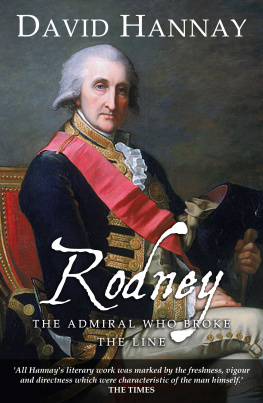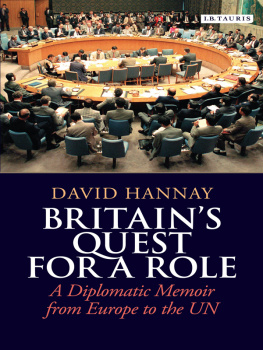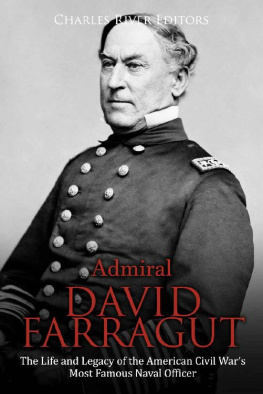Rodney
David Hannay
David Hannay, 1891
David Hannay has asserted his rights under the Copyright, Design and Patents Act, 1988, to be identified as the author of this work.
First published in 1981 by Macmillan and Co.
This edition published in 2016 by Endeavour Press Ltd.
Table of Contents
Chapter 1 Family and Early Career
George Brydges Rodney, the most famous of the great generation of English admirals who raised the navy to the level at which Nelson found it, was by descent a Somersetshire man. The family was one of considerable antiquity of more antiquity indeed than fame. From the reign of Henry the Third until far into the seventeenth century they were established as owners of land in and about Stoke Rodney, at the foot of the Mendips, in the valley of the Axe between Draycott and Wells. The history of the house was summed up by Sir Edward Rodency, the last of them who held the family estate, in words which I do not presume to think I can better, and shall therefore quote.
Their faults whatsoever are not written in great letters, or become the subject of common fame, or the courts of justice; but as they lived without scandal, so they died without shame, going out of the world by the ordinary gate of sickness, and never by the hand of violence, some few excepted of ancient times, that died in the wars, and the late unfortunate gentleman, Sir George Rodeney, who fell by his own sword; and although civil dissentions, in the Barons Wars, did engage men in one side or the other, yet they for any I can find lived in a calm amidst these tempests, and were not entangled in the quarrels of the times. The reason of it may be that having a firm estate of their own, and able to subsist of themselves, they kept independent, living within their own orb, and mastering those affections of envy and ambition which commonly do but raise men for a greater fall. They had been always, from the time we first discover them, of the middle rank of subjects which is the most safe place Cives medii salvi sunt maxime, few or none of better estate, under the degree of Lords until the great flood of Church lands (whereof they possessed not one foot) improved many mens fortunes to a great height; nay, which is strange, from Sir Richard Rodeney, who was borne under Henry the Third, to Sir George Rodeney in 42 of Elizabeth, the space of above four hundred years, they stood like Mare Mortuum and neither ebbed nor flowed in their fortunes; they were so provident not to lessen; but neither by marriages, which is the ordinary step of augmentation, nor by any other means did they make any addition, insomuch that at this day I give the coat single which my ancestors gave without quartering any other.
Here, adorned with the brocaded elegance proper to the time of the writer, is a summing up of the history of a solid English country family. Stoke Rodney lay out of the track of the great storms of English history, and its position helped the family to stand like Mare Mortuum for four hundred years. Still, a house which could live through all that happened in England between Henry the Third and Elizabeth without loss or gain, must have been of an equable temperament, free from great vices, follies, or qualities. The last stage was less peaceful, for Sir Edward Rodeney has to record money troubles and family disputes. He was himself a more stirring man than his ancestors had been. In his youth he fled abroad with Sir Edward Seymour, the husband of Arabella Stuart, afterwards Marquis of Hertford. His exile, however, was short. He returned, was married, not, as he complacently records, without splendour of ceremonial, to Mistress Frances Southwell, a lady of Queen Annas private chamber, in 1614, and spent the remainder of his life as a country gentleman in the west. In 1626 he was a deputy-lieutenant, and felt himself called upon to explain in his place in Parliament the excesses of the pressed men who were drawn into the west by Buckinghams unlucky expeditions, and were treated as to pay and provend with that little care which Captain Dugald Dalgetty told the Marquis of Montrose might, according to custom, be bestowed on the common soldier. Sir Edward was a strong Royalist, and lived long enough to suffer for his royalism. Although he was otherwise a man much of the same kidney, he did not share the Baron of Bradwardines opinions as to the duty of keeping a family estate in the male line. His only son died before him, and he allowed Stoke Rodney to pass to his daughters. One of these ladies married into the family of Brydges of Kainsham, and thereby supplied a cousin of hers with a useful connection.
Sir Edward could have found male heirs had he so chosen, for he had three brothers: Henry, who was drowned on the coast of Africa; William, who does not concern us; and George. From this George came Anthony (the first of the family who spelt his name Rodney), Lieutenant-Colonel of Leighs regiment of horse, who served under Peterborough in Spain, and Henry. This Henry was the father of the Admiral. Having begun as a cornet of horse, he left the army and then was appointed, by the interest of his connection the Duke of Chandos, the representative of the Brydges of Kainsham, to a post in the Royal Yacht of George the First. Henry Rodney had a family of five children by his wife, Mary, daughter of Sir Henry Newton, Envoy-Extraordinary to the Grand Duke of Tuscany, and afterwards Judge of the Admiralty, etc. etc. He naturally profited by his position for the good of his family. The King stood godfather to the second son, together with the Duke of Chandos, and the boy was christened George Brydges. It was for this reason, according to Major-General Mundy, the Admirals son-in-law and the editor of his correspondence, that the Christian name of George, which had been common in the Rodney family, was given to the boy who was to live to break the French line on August 12th, 1782.
This is the family account of the Admirals descent, and there is no reason to doubt its substantial accuracy. Sir Egerton Brydges, than whom no one was better entitled to insist on the delusions to which men are subject when their pedigrees are in question, does indeed utter a word of warning in his edition of Collins Peerage. He remarks with perfect truth that the slender notice taken of such branches [as this younger branch of the Rodneys to wit] in the Heralds Visitations, the long disuse of those visitations, together with the general confusion in which this kingdom was involved by the Civil War between King Charles and the Parliament, and the great destruction of family deeds and evidences which it occasioned, must render it extremely difficult, if not altogether impossible, for not only his lordship, but also most of the descendants from younger sons of the best families of the kingdom to join themselves to their old family stock. These are words of wisdom, and it is just possible that the Admiral did not really descend from the Rodneys of Rodney Stoke. Still there is good evidence to show that the claim was well founded. It was recognised by the Duke of Chandos when the Admiral had become famous, which is something; and, what is much more, it was allowed in his youth by George Brydges of Avington and Kainsham a representative of the house into which Sir Edward Rodeneys daughter had married. Sir Egerton Brydges has himself recorded that young Rodney was brought up and spent part of his early youth under the patronage of George Brydges of Avington and Kainsham, which confirms the presumption of his descent. We may therefore take it as reasonably well proved that the Count de Grasse, who by the way dated from the tenth century, was defeated and taken off Dominica by a gentleman of descent not greatly inferior to his own. It is just possible that the Admirals Christian names were given in compliment to the kinsman who patronised his early youth. Henry Rodney was at least fortunate in that he was able to so name his son as to give him a species of claim on his King, on one whom his King delighted to honour, and on a relation whose interest was well worth having. The boy started in life in the position of a gentleman with excellent connections.










